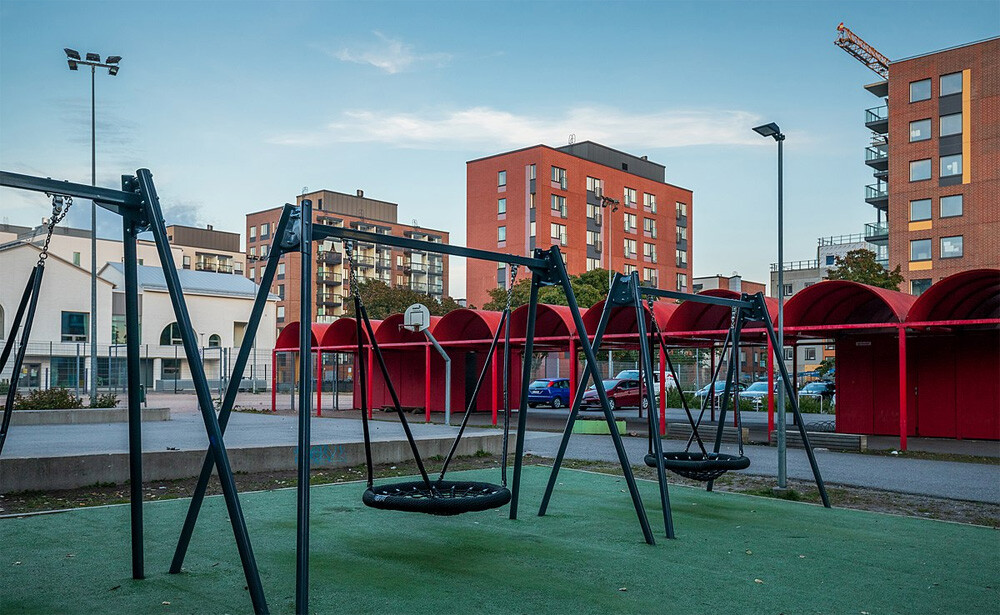4 Ideas About Education That Everyone Gets Wrong

There's one fact about the education system that we can all agree on. That fact is ... hold on ... wait, we thought we had something here. Okay, it turns out there is lot of debate about nearly every aspect of the education system. And a lot of the narratives we all take for granted might not be true at all.
"Equality In Education Means We Must Help Girls!"
Everyone says:
We've got to get more girls to think about STEM careers (that's science, technology, engineering, and math, for those of you without access to a dictionary). Girls are often socialized to believe the hard sciences are for boys, and there’s a definite gap in the number of them that go into STEM careers. Less than 30% of all positions in STEM are occupied by women.
And look at all the boards of huge companies. Most positions of leadership are held by men. Men make more money and hold the most power. Hell, look at Congress! We need to educate girls better, to help women of the future. Especially when it comes to math and science. You know STEM, or is it STEAM … wait, it’s STREAM isn’t it? Is that what it is now?

But ...
Okay, what about boys, though? Because boys are in really, really rough shape when it comes to education. In 2021, 1.5 million fewer people went to college. But over 70% of that drop was men. That meant men made up only 40.5% of all college students, an all-time low. Men are less likely to graduate once they make it to college.
But that’s once boys hit college age. By then it’s too late. The problems start way, way earlier, back when they’re young enough to read Hardy Boys and fantasize about their arsenal of Nerf weapons.

Boys are 80% of all high school dropouts. They earn 70% of the Ds and Fs in school, and are six points less likely to graduate high school than their female counterparts. Girls get better grades, not just in America, but worldwide, in every subject, including science and math (making the whole STEM career gap even weirder.) Boys are also hit harder by discipline, suspended at more than twice the rate of girls. They’re also twice as likely to be diagnosed with ADHD.
These differences might exist because most teachers are women, or girls just read more regardless of age, or that America cut recess down to a paltry 27 minutes a day, so their students could sit still and take more tests. Fun fact: Finland, education powerhouse and foundation of many an education think-piece, mandates 50 minutes of midday recess and a 15-minute recess for every 45 minutes of school.

It could also be that, even if girls are taught that math is too hard for their delicate, soon-to-be-lady brains, they come to the classroom with distinct advantages. They’re socialized to sit quietly, obey the teacher, and generally be pleasant. They come to the classroom with a disposition that teachers want to see in children—schools want compliance, especially sitting still, something boys just aren’t good at until they get older. They also come to the table (desk?) with more fully developed brains.
So it turns out that as much power as men have in society, boys really do need some help. With school, and with figuring out the best neon design for their Nerf toys; boys can have it ALL.
"We Need A Miracle ... Like They Had In Texas!"
Everyone says:
There are proven things you can do to give kids a leg up. You can make sure their schools have good ventilation, have working air conditioning, start late enough to get kids enough sleep, and are desegregated (which benefits all students, no matter their race). But while all these things help, they won’t magically transform kids into textbook-devouring maniacs. So Americans looked for a miracle.
If you’re old enough to remember the 2000 election, you’ll remember that one of the lines that helped elect George W. Bush was that the "soft bigotry of low expectations" was burdening minority Americans (as opposed to, you know, the hard bigotry of segregated schools). Bush was touting his record on education, in particular the "Texas Miracle."

You see, when W. was governor in the '90s, Texas experienced huge improvements in its schools. The state began to close the achievement gap between poor students and rich ones, appeared to lower dropout rates, and basically improved education throughout the state. The whole system rested on a single, high-stakes test done in the 10th grade. The bonuses of principals and the careers of teachers depended on it.
But ...
For a while, everything seemed great in Texas … except things weren't so great at all. Schools got up to a whole lot of shenanigans to push their scores as high as they could possibly be. Most common was preventing kids who would did poorly from taking the test by holding them back a grade and getting them to drop out. It was so bad that almost a third of kids who started high school in Texas didn’t finish. Teachers changed test answers, fudged dropout rates, and generally acted like Tony Soprano with a teaching degree.

HBO
And with all this hubbub, nothing really changed. Texas isn’t anywhere near the top of the charts in terms of educational achievement. And the worst thing? Kids in school districts that absolutely couldn’t afford it spent a ton of money, not on instruments, paints, or that old standby of actual books, but on test prep materials.
Since then, there have been ‘miracles’ all across the United States. There was a New Orleans Miracle, an Atlanta Miracle, a Florida Miracle, miracles everywhere. None of them seem to last. But we people still think we need a miracle, because …
"The Rest Of The World Beats America In Education"
Everyone says:
OK, squishy moderate writer guy, you can mock miracles all you like, but look at international standings. We’re nowhere near number 1, and we’ve been sinking in international testing ever since forever! Before too long, China is going to be eating our lunch, because they have such a high graduation rate and they actually learn things in school.

NBC
What percentage of kids actually graduate from high school in the United States? It’s 86% according to the most recent data. In a country like China, the graduation rate is significantly higher, at around 95%.
But ...
Here’s another number you should know: 24. That’s the percentage of working-age adults in China that have completed high school. In America, it’s above 90%. See, in China, they only have compulsory education up to the equivalent of the 9th grade. Beyond that, a student usually pays for it or goes without. It’s weird enough that it makes you question whether that country's read Mao at all!
This isn’t to say that China has a garbage education system (it doesn’t) but it does mean that comparing American and Chinese systems is a bit more complex than we’d like it to be. But we love to try, because that means we can turn education into a competition. We do that with a big test: The Program for International Student Assessment. It’s been around since 2000, and every three years, it tests high school students worldwide. It’s usually the thing newspapers breathlessly report on when they talk about students "falling behind" (falling behind what, they never mention).

In 2018, Americans scored 13th in reading among all the nations and actually improved their score significantly between 2015 and 2018. Americans scored 12th in science. Even in math, where Americans are usually said to stink, the US scored 36 out of 79 among the nations PISA tested. That’s not great, right? But it was really a six-way tie for number 31, immediately behind Luxembourg, which isn't exactly terrible.
Educating America is hard. There are almost 140,000 schools educating over 50 million kids. And judging how that system is working is even harder. You have the fact that rich states like Massachusetts have enviable school systems, but they’re counted with poorer states that don’t perform as well, not because the students are dumber, but being poor is hard everywhere, and it’s particularly hard in the US. It’s complicated further by how there really is no one set formula for teaching kids. If there was, we’d be doing it. Some schools are going to do a great job, no matter what. Some are going to do a bad job, no matter what.
And what is that job? Is it to make a compliant workforce, as so many bitter comedians have alleged? Alleviate poverty? Cure inequality? Solve racism? Prepare kids for the adult world? Make better people? Create America itself? All of the above? Seems like something you’d need to know to actually judge whether schools are doing well or terrible.
"Things Are Just Getting Worse! Just Look At This Report!"
Everyone says:
Let's take you back to 1983. Reagan was president, and it was "Morning in America." The newly formed Department of Education published a report called A Nation at Risk: The Imperative for Educational Reform. Reading the thing, you get a sense for how Americans felt at the time: they were surrounded by competition, driven by nations who were building better cars (Japan), better tools (Germany), and better workers (everywhere).
It was a deeply pessimistic document, especially for the perennially optimistic Yanks. It talked about how America was "no longer secure" and that "other nations were matching or exceeding our educational achievements." It was summed up best in the line: “If an unfriendly foreign power had attempted to impose on America the mediocre educational performance that exists today, we might well have viewed it as an act of war.” Which was a profoundly American line, in that it equates something to war and stops making sense after two seconds of thinking about it.

At the time, this was a big deal. There were hearings in Washington, tons of op-eds in local papers, commissions set up. You know, the thing you’re supposed to do when there’s a national crisis. It sold a lot of papers too. The narrative took hold, and found itself rooted in American educational thinking ever since.
At first swipe, the report looked pretty damning. In just one example, the authors cited SAT scores, which dropped like a rock between 1963 and 1980, with average verbal scores dropping 50 points and average math scores dropping 40 points.
But ...
During that period, Americans were successfully educating more people. The SAT is a test you take if you’re trying to go to college, and more Americans were put in a position where they could even consider it. A great deal of its analysis was wrong too, because it compared the young elites of other countries to young Americans as a whole.
An objective look into American schools was never the point of the report in the first place. The point instead was to allow Reagan to push an agenda of school choice, tax credits for private school tuition, voluntary prayer in schools, and the abolition of the Department of Education, the department that, uh, wrote the report.

Either way, it took ten years before anybody tried to check the math. Weirdly, it was the Department of Energy that did it. They published a report called Perspectives on Education in America, and it laid out a solid argument that, no, American schools weren’t all raging dumpster fires. It was (allegedly, but come on) nearly buried by the first Bush administration, but eventually it did make its way out.
The correction was covered in newspapers the way they usually cover those kinds of things: proverbially, and literally, on page 23. Because the "THINGS ARE BURNING DOWN OHGODOHGODOHGOD!" sells papers. “Hey, we have some improvements to make, but things on the whole are pretty ok” usually doesn’t. That’s what got America to a weird place where 70% of public school parents give their local school a good grade, but the same parents give education in the US as a whole much worse one.
There’s a lesson in there somewhere, but damned if we know what it is. Rhetoric 101 was, just, really early you know.
Steven Assarian is a librarian. He writes stuff here.
Top image: Element5 Digital/Unsplash
